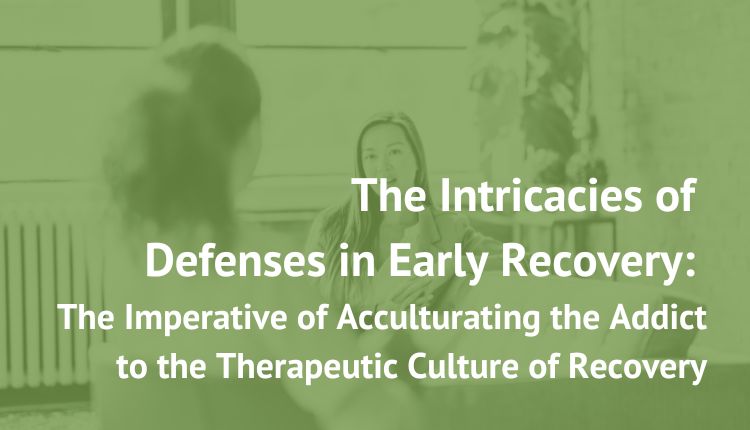The Imperative of Acculturating the Addict to the Therapeutic Culture of Recovery
The early stages of addiction recovery are often characterized by the intricate and multifaceted defenses developed by the addict, which simultaneously serve as both a mechanism of self-preservation and a formidable barrier to genuine therapeutic progress. This essay delves into the complexity of these defenses and the critical need to acculturate the addict to the recovery milieu, drawing from the insights of Philip Flores in his authoritative work, Addiction as an Attachment Disorder.
The Intricate Architecture of Addictive Defenses
In early recovery, addicts use defenses that are more than just superficial barriers. These defenses are deeply embedded in their psyche, formed over years of substance use. They act as sophisticated mechanisms to shield against profound emotional pain and relational disruptions. Flores, through his exploration of addiction as an attachment disorder, elucidates that these defenses are not simply pathological behaviors but are rooted in the addict’s adaptive response to chronic attachment wounds and relational deficits.
Defenses such as denial, intellectualization, and minimization are complex psychological constructs. They serve to insulate the addict from vulnerability and emotional distress. These defenses are not just cognitive distortions but are intricately linked to survival strategies. These strategies have evolved to navigate a world perceived as emotionally perilous and lacking secure attachment. Over time, these defenses become more sophisticated, allowing the addict to maintain a semblance of functional equilibrium even as substance use escalates.
In early recovery, these defenses manifest in subtle and often insidious ways. As a result, they present significant challenges to the therapeutic process. The addict may appear compliant and intellectually engaged in recovery. However, internally, they may maintain a stronghold of resistance due to the fear of emotional exposure. This fear stems from the potential loss of the very defenses that have long served as protective armor. Consequently, this creates a complex therapeutic dynamic. Clinicians must navigate the delicate balance between confronting these defenses and fostering a therapeutic alliance that can support the addict’s transition into recovery.
The Imperative of Acculturation to the Recovery Milieu
Flores posits that for recovery to be truly transformative, it is essential to acculturate the addict into the recovery culture—a process that requires dismantling the entrenched defenses and fostering the development of new, adaptive relational patterns. Acculturation in this context extends beyond mere behavioral modification; it necessitates a profound shift in the addict’s relational paradigm, moving from a state of isolation and self-protection to one of openness and connectedness.
The recovery culture, as embodied by groups such as Alcoholics Anonymous (AA), provides a new attachment framework. Here, the addict can begin to experience the safety and security of relational bonds without the mediation of substances. The rituals, language, and communal support of the recovery environment serve as a crucible for reshaping the addict’s attachment schema. This offers a sense of belonging and purpose that is antithetical to the isolation and despair that often characterize active addiction.
However, the transition into this new cultural milieu is fraught with challenges, particularly given the sophisticated defenses that the addict brings into early recovery. These defenses, which once served to protect the addict from perceived relational threats, now obstruct the very vulnerability required for meaningful engagement in the recovery process. The fear of rejection, abandonment, and exposure—rooted in past attachment injuries—can make the prospect of acculturation to recovery appear daunting, if not outright threatening.
Clinicians must approach this process with a deep understanding of the relational underpinnings of the addict’s defenses. Therapeutic interventions should be crafted not merely to dismantle these defenses but to replace them with healthier, more adaptive relational strategies that align with the recovery culture. This involves creating a therapeutic environment that mirrors the principles of the recovery community—emphasizing safety, trust, and mutual support—while gently guiding the addict toward full participation in this new relational framework.
Integrating Theory into Clinical Practice
Flores’ conceptualization of addiction as an attachment disorder offers a nuanced framework for understanding the sophisticated defenses observed in early recovery. By recognizing the relational origins of these defenses, clinicians can adopt a more nuanced and empathetic approach to treatment.. This approach acknowledges the protective function of these defenses while simultaneously working to foster new, recovery-oriented relational patterns.
The process of acculturation to recovery, therefore, becomes a matter of facilitating the internalization of new attachment models. Hereinthe addict can experience secure, supportive relationships that reinforce their commitment to sobriety. This requires a delicate balance of confrontation and support, where the clinician helps the addict to gradually dismantle their defenses while simultaneously offering a new, more adaptive relational framework through which to engage with the world.
In conclusion, the sophisticated defenses of an addict in early recovery demonstrate both their psychological resilience and a significant barrier to healing. The process of acculturating the addict to the recovery world is not just about behavioral change. Instead, it requires a fundamental restructuring of their relational patterns. As Flores explains, recovery is a deeply relational process. It demands the reconfiguration of attachment dynamics that have long sustained the addiction. By integrating these insights into clinical practice, clinicians can help addicts navigate the complex transition. This transition involves moving from the defenses of addiction to secure attachment frameworks that support lasting recovery.
Works Cited
Flores, P. J. (2011). Group psychotherapy with addicted populations: An integration of twelve-step and psychodynamic theory (3rd ed.). Routledge.
About the Author of This Article

Dr. Cindy Sample, an accomplished psychotherapist with 25 years of experience, is a leading expert in addiction treatment and attachment disorders. Her work in the Washington, DC, area, both in private practice and at the IOP level, has earned her a reputation for excellence. Dr. Sample’s approach is individualized, recognizing that no single method works for everyone. She focuses on the crucial role of relationships in addiction and recovery, providing compassionate, tailored care to each patient. Her expertise in psychotherapeutic counseling makes her a respected figure in the clinical community, especially in treating addiction and attachment issues.

